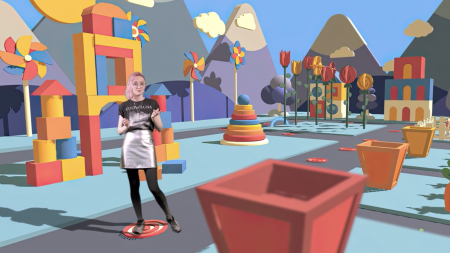- The school
- Studies and Research
- BACHELOR
- MASTER
- TRANSDISCIPLINARITY
- POOLS
- Research
- Workspace - CERCCO
- CONTINUING EDUCATION
- For students
- Studying at the HEAD
- InfoLab
- Living in Geneva
- Tuition fees and sholarship
- Library
- Regulations and instructions
- Projects
- Events
- Press
- Partnerships and prizes
Game design
Understand and sequence the essential steps in creating a game in order to launch its development.
The world of games is gaining more and more ground: game consoles, mobile games, board games, serious games and even games designed to explore complex knowledge in greater depth. Gamification is a way to explore complex ideas, concepts and know-how. Games can also be used to tackle controversial topics and open up a debate in a more relaxed way. As a result, schools, companies, associations and activists are now using games to collaborate, popularise and democratise their ideas.
The profession of game designer lies at the crossroads of several existing and emerging disciplines focused on the design of playful experiences. The role of the game designer is to grasp and bring out the often intangible but essential forms of a game: the game experience, the game loop, the progression curve of the players and interaction design. The game designer guarantees the game experience and the coherence between its different components.
This course focuses on the development of a game concept. After sessions of analysis, writing, rapid prototyping and play tests, participants will produce game design documents, which are necessary to rally the various stakeholders around the central concept of a game. Illustrations and interactive models will be produced and will allow participants to grasp the concept at the heart of their game project, its aesthetics and the way to play it. A synthetic presentation will also be produced to pitch the game concept.
Target audience
This course is primarily aimed at people who are familiar with the fields of art and/or design and who wish to strengthen their professional integration in fields related to emerging technologies.
Targeted skills
This course will enable participants to develop a game concept and produce all the documents necessary to explain and communicate it to a production team.
Through the analysis of existing games, the writing of a pitch and the production of UX design documents (diagrams, schematics, wireframes, interactive mock-up), participants will learn about notions of game loop and game experience, as well as about the art of pitching which allows them to explain a project and to gather the necessary funds and collaborators for the creation of a game.
Details:
Ability to analyse fundamental notions of video games such as game mechanics, game loops, difficulty curves and interaction design.
Basic knowledge of experimentation, rapid prototyping and game writing tools.
Skills in the art of pitching, in particular defining the game concept, gameplay and game mechanics and identifying the target audience.
Ability to write game design documents for future collaborators, as well as a synthetic presentation for future investors.
Prerequisites
No technical skills are required apart from a basic command of how a computer works (word processing, file management, etc.).
Teaching methods
Writing sessions, presentation and analysis of games, testing sessions, creation of models, design of a presentation (the art of the pitch)
Certification
Certificate of Continuing Education
Credits
2 ECTS credits
Practical information
From January 12,2024 until February 10, 2024
Languages: French, English
Course format: courses and workshops
Fee: CHF 1,200/ HEAD – Genève alumni CHF 900
Location: Campus HEAD, Building H, Room H – 4.01, Av. de Châtelaine 7, 1203 Geneva
Information and registration/admission
Contact: fc.head@hesge.ch
Follow this link to register
General terms and conditions
Module Heads:
Marion Bareil
Joint founder of the game studio Tourmaline, Marion Bareil has designed, developed and published numerous games. Her hybrid game Oniri Islands allows two players equipped with figurines to experience an interactive tale by travelling in a virtual world thanks to a tablet that recognises their position and orientation on its surface. She also co-directed the Democrapcy project, a game to raise awareness among teenagers about voting, in collaboration with HEAD – Genève and the Chancellery of the Canton of Geneva. She organises numerous workshops on game design, game development and interactive narration.
Douglas Edric Stanley
American-born artist Douglas Edric Stanley works primarily in the field of new media and more specifically on the relationship between algorithms and aesthetics. As an artist, designer, curator, developer and theorist, he focuses on the way various disciplines are transformed by the progressive “algorithmisation” of the world. Active in the video game industry and in experimental forms of play, he is joint founder with Antonin Fourneau of the monstre-à-n-têtes also known as ENIAROF. He has led numerous creative coding and experimental game design workshops for various museums, associations, universities and art schools and has participated as an artist in several exhibitions related to computer art.
Programme & agenda 2023 /8 half-days
#1 – Friday 12 January 2024 from 2:00pm to 5:30pm
Conference: Introduction to game design
Game sessions (narrative, strategy, platform, action)
Game analysis
#2 – Saturday 13 January 2024 from 9am to 12:30pm,
Project Ideation
Writing and prototyping tools
#3 – Friday 26 January 2024 from 2:00pm to 5:30pm
First pitch
Play sessions
Game analysis
#4 – Saturday 27 January 2024 from 9am to 12:30pm
Writing the project
#5 – Friday 2 February 2024 from 2:00pm to 5:30pm
Game design documents and summary presentation
Writing session
Second pitch
#6 – Saturday 3 February 2024 from 9am to 12:30pm
Game sessions
Game analysis
#7 – Friday 9 February 2024 from 2:00pm to 5:30pm
Finalisation of the projects
Finalisation of the game design documents and the summary presentation
#8 – Saturday 10 February 2024 from 9am to 12:30pm.
Final pitch

